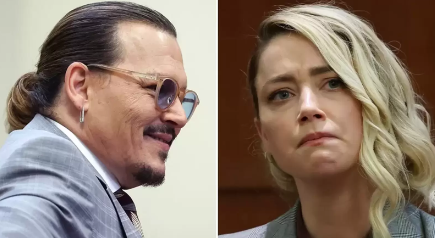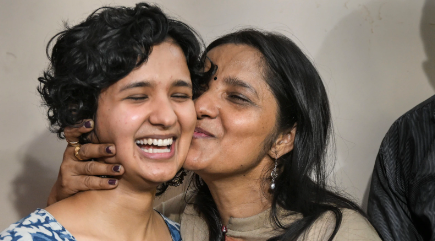
The seven member jury, two women and five men, in a Virginia courtroom has reached a verdict after a six-week trial. Both actors are liable for defamation but Depp has been awarded a significantly higher amount of US$15 million (reduced to $10.35 million to conform with Virginia law) to Heard’s $2 million. Heard has said she is ‘heartbroken’ by the decision; her lawyers say she can’t afford to pay and will appeal.
Here are some takeaways from the verdict.
Can men be victims of domestic abuse?
Yes they can, and are. Statistics tell us that one in three women worldwide, including in India, are subject to intimate partner violence. While there is no data for male survivors in India, the US-based National Coalition Against Domestic Violence estimates that one in four men experience some form of violence from a partner in America. In cultures with fixed ideas about masculinity and what it means to be a man, it is extremely difficult for a man to come forward as a victim.
But, being a victim does not automatically mean you can’t be an abuser too – and this applies to both Depp and Heard.
Amongst the evidence of abuse presented by Heard:
- Photographs, audio recordings and text messages by Depp that also amount to abuse even if made as a ‘fantasy’ joke-type thing.
- A temporary restraining order against Depp by a Los Angeles court during her divorce proceedings.
- A verdict from a UK court where Depp lost a libel trial in 2020 against The Sun newspaper for calling him a ‘wife beater’. The judge there said a ‘great majority’ of Heard’s accusations could, in fact, be proven.
Trial by public opinion
Some 18 million Americans watch evening TV news. On TikTok, the hashtag #JusticeforJohnnyDepp topped 18 billion, yes that’s billion with a b, while #IStandWithAmberHeard trailed at 8.2 million views.
Regardless of the truth about whether Depp was abusive or not towards his ex wife, the vilification of Heard on social media has been unprecedented—one meme that showed her blowing her nose into a tissue claimed she was snorting cocaine in the courtroom. There is much, much worse, but I’ll leave that for you to discover, if you have the stomach for it.
Underlining all the anti-Heard memes is the fact that domestic abuse is now a ha-ha, meme-generating moment that can be packaged as entertaining content for anyone who wants to watch.
Searching for the perfect victim
Innumerable judgments of assault against women place an inordinate focus on the woman. Trials in India have dismissed rape charges on grounds that range from, she-fell-asleep-after-saying-she-had-been-raped to the survivor’s past sexual history. Rape adjudication and sentencing is deeply influenced by stereotypes of the victim, finds Mrinal Satish, a professor of law and author of a book that examines 25 years of rape jurisprudence from the Supreme Court and high courts.
The problem with the idea of the ‘perfect victim’ is the subjective bias it puts survivors through. In any event, a victim is already damned if she does, damned if she doesn’t.
Cries too much during testimony? She’s hysterical.
Doesn’t cry enough? She’s cold and calculating.
This is a battle nobody can win.
So where does that leave survivors of domestic abuse?

In India, women are socially conditioned to never complain, to believe that pati is parmeshwar. To understand how ingrained this attitude is, comes a chilling tale of the death by suicide of three sisters, two of them pregnant, along with their two children from Rajasthan’s Jaipur district.
Daughters of a landless labourer, the sisters, the eldest 27 and the youngest 20, were married to three brothers. The younger of the two children was just a 22-day-old infant. All three were educated, one a postgraduate, the other a graduate and the third had enrolled to complete a Bachelor’s degree in education. Their bodies were discovered at the bottom of a well on May 28.
The drastic decision of the sisters was reached after years of domestic abuse aggravated by a lack of dowry. Why didn’t they speak up? They did. In 2018, the eldest registered a police case of dowry harassment and domestic violence against her husband and in-laws but withdrew it after a ‘compromise’ was reached.
A fortnight before their death, the eldest was beaten so severely by her husband that she ended up spending eight days in a Jaipur hospital, say family members. No police complaint was filed.
Lack of structural support
Heard talks about ‘our culture’s wrath’ for daring to speak up against a popular actor. Her evisceration on social media is proof of that wrath.
In India, despite a law against domestic violence, police remain reluctant to file complaints, accepting ‘compromise’ (or actively urging it). Data tells us 19 women are killed every day because of domestic violence and another 19 a day over dowry.
Activists and even the National Commission for Women reported a spike in domestic violence during the lockdown. Yet the minister for women insisted that this spike was exaggerated.
Very often, the process is the punishment. Defamation in India is a criminal offence, and not just a civil one as in the United States. Calling the Depp-Heard verdict ‘disturbing news’, senior advocate Indira Jaising, a key figure in drafting India’s domestic violence law said husbands could now file criminal action against wives for accusing them of domestic violence.
Some of the women who spoke up during India’s #MeToo movement faced years of expensive, emotionally exhausting litigation. Journalist Priya Ramani won her case filed by former minister and editor M.J. Akbar. He has now filed an appeal in the high court, and the case continues.
What will it take to believe women?
GENDER TRACKER
The gender employment gap between men and women is 58 percentage points. If bridged, India’s GDP could expand close to a third by 2050, or US$ 6 trillion.
Source: Bloomberg Economics

GOING PLACES:

Results for the 2022 civil services exams are out and the top three ranked are all women. Shruti Sharma, an alumna of Delhi’s St Stephen’s College topped, followed by Ankita Agrawal from Kolkata and Gamini Singla from Punjab’s Anandpur Sahib. Amongst the top 25 candidates, 10 are women.
WATCH
A video of sanitary sweeper Laxmi Mukhi sweeping the roads in the Baripada municipality in Odisha’s Mayurbhanj district with her baby strapped on her back has gone viral. Mukhi told ANI she was alone at home and, so, had to carry her child to work. In the same video, the chairman of the Baripada Municipality says he has instructed his officials to watch on her needs.
By law, establishments that employ more than 50 people must have a creche for working mothers.
Watch here.
[Video credit: ANI]
STORIES YOU MIGHT HAVE MISSED
In Hyderabad, political angle to gang-rape

Details are emerging of the gang-rape of a 17-year-old girl in a moving car in Hyderabad. Police have arrested five men, including three minors and two 18-year-olds from influential political families but have not named them yet. A Mercedes Benz owned by the family of one of the men has also been seized.
The girl is said to have been raped on May 28 after a party at a pub in Jubilee Hills, an upscale neighbourhood. The complaint was filed two days later by her father after he noticed injuries on her body and she told him that she had been gang-raped.
BJP members in the state allege that the police is trying to protect the accused who they said are close to leaders from the TRS and AIMIM.
On Twitter, outrage over ad promoting rape culture

Deo ads aren’t exactly known for their progressive messaging with their inevitable plot of, use deo, women will swoon.
But this one made by Triton Communications by Layer’r Shot, a body spray brand from Adjavis Venture Ltd, promoted by Devendra N Patel, crosses even that line. Aired during IPL, the ad is an open promotion of rape culture that shows a group of men, rolling up their sleeves, barging into a bedroom where a man and woman are seated on a bed. “Shot maara kya?” one asks. “Ab hamaari baari hai.”
On Twitter, food consultant Monika Manchanda wrote: “I actually really felt the fear for a few seconds.”
Advertising regulator ASCI, which was tagged in Manchanda’s tweet, said the ad was in ‘serious breach’ of its code and has asked the advertiser to take down the ad, pending investigation.
The same ad agency had earlier made an equally objectionable ad for the same brand.
In Kerala, same-sex couple reunited

The Kerala high court reunited an adult, same-sex couple allowing them to live together days after they were separated by their parents who disapproved of their relationship. Read more
FIELD NOTES
The complex dynamics of gender-based violence

Intimate partner violence is associated with an increased risk of miscarriage, still birth and maternal health complications, finds a study by the International Growth Centre . The repercussions include unhealthy breastfeeding practices, lack of skin-to-skin care, delayed bathing and postpartum contraception use.
The study found that 45% of mothers of children below two years in Bihar reported sexual violence, most often accompanied by physical violence. Almost half these women reported sexual violence as well.
Epidemiological studies of burn patients at the Patna Medical College hospital showed that women aged between 20 and 39 from rural areas and low social and economic status were most affected. These women are reluctant to report burn injuries to avoid any police investigation.
There is evidence, however, that targeted field-based intervention results in six times more women receiving the help they need.
My note: The fifth round of the National Family Health Survey finds that 40% of married women reported being subject to domestic violence.
Read More here.
ELSEWHERE
Does Google have a caste problem?

The cancellation of a talk during Dalit History Month by Dalit activist Thenmozhi Soundarajan to employees of Google News has led to the resignation of a senior manager, Tanuja Gupta who had invited her to speak.
The talk by the founder of Equality Labs, a Dalit civil rights organisation was cancelled after several Google employees called her ‘anti-Hindu’ in emails to company heads, reports The Washington Post .
“Caste is already present and dividing Google’s workforce,” stated an Instagram post by @equalitylabs. “Thousands of South Asians and caste-oppressed members of your workforce deserve a safe workplace and it is your civil rights obligation to ensure that is the case. Progress around civil rights does not move at the pace of the bigoted or the fragile.”
Soundarajan has reportedly written to Google CEO Sundar Pichai but has received no reply from him.
Sheryl Sandberg leans out
Fourteen years after she joined Facebook, Sheryl Sandberg one of the most influential women in Silicon Valley, has announced that she is quitting Meta, Facebook’s parent company that also owns Instagram, WhatsApp and Messenger. The author of Lean In says she plans to focus on her philanthropic work and will continue to serve on the company’s board.
BEFORE I GO
Who’s Mrs. J.M. Lloyd, I asked in my last newsletter. It’s the tennis star better known as Chris.
| Were you forwarded this email? Did you stumble upon it online? Sign up here. |
| That’s it for this week. If you have a tip or information on gender-related developments that you would like to share write to me at: namita.bhandare@gmail.com. |